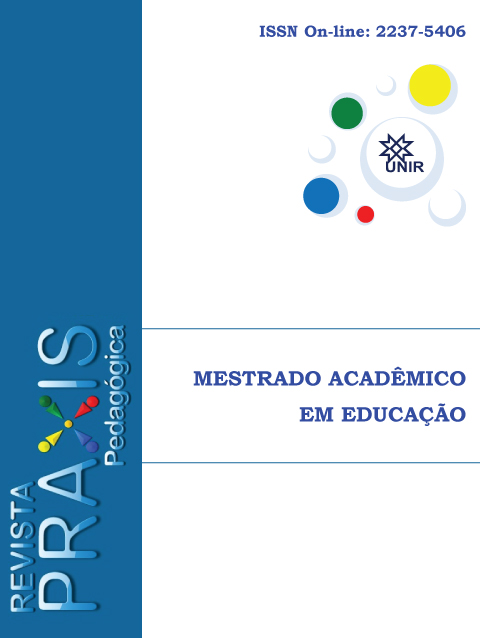EVALUATION OF LEARNING
PROCESS OF (RE) CONSTRUCTION OF KNOWLEDGE OR ACCOUNTING?
DOI:
https://doi.org/10.69568/2237-5406.2020v4n5e4197Keywords:
evaluation, learning, constructivismAbstract
The objective of this work is to bring reflections about the evaluation of learning as a curricular dimension, its main modalities and the characteristics of a constructivist teacher. The dimension of evaluation is discussed, not as a final product, accuracy of account, nor as an instrument of threat and previous torture of students, leading to fear and memorization, but rather as part of the learning process, which aims to guide, regulate, rethinking the didactics of work, better planning the teaching. The assessment of learning must be inclusive, dialogic, dynamic and constructive. For the present approach we use the field research method of the descriptive type, with inspiration of the quantitative type approach. The main purposes that guided the present approach were: to identify teachers 'conceptions about school evaluation and whether they are being developed within the constructivist horizon, as well as to diagnose students' ideas about the evaluation modalities followed by teachers. For this, they were applied to teachers and students of the Headquarters School Complex of Wisdom - Benguela-Angola, questionnaires that identified the students' main ideas about evaluation and verified that most of the teachers work within a tendentially constructivist horizon, even without much knowledge , both on the evaluation, as well as on the curricular contextualization, that puts the knowledge in tune with the reality of the students. Thus, we dialogued with Hadji, Hoffmann, Luckesi, Libâneo and others who discuss the evaluation process of school learning.
Downloads
References
ANGOLA. Lei de Bases do Sistema Educativo Angolano. Lei de Base do Sistema de Educação e Ensino Nº 17/16 de 7 de outubro. Angola, 2016
ANTUNES, Celso. A avaliação da aprendizagem escolar. 7. Ed. Petrópolis, Rio de Janeiro: Vozes, 2008
BASTOS, Wagner Gonçalves e MELO, Edna Sousa. Avaliação Escolar Como Processo de Construção de Conhecimento. Estudo de Avaliação Educacional. São Paulo, v. 23, nº 52, p. 180-203, 2012.
CARVALHO, José Sérgio. As noções de erro e fracasso no contexto escolar: algumas considerações preliminares. In: AQUINO, Júlio Groppa (Org.). Erro e fracasso na escola: alternativas teóricas e práticas. São Paulo: Summus, 1997.
FREIRE, Paulo. Pedagogia da autonomia: saberes necessários à prática educativa.
ed. São Paulo: Paz e Terra, 1996.
HADJI, Charles. Avaliação desmistificada. Porto Alegre: Artmed, 2001.
HADJI, Charles. Para escolher e utilizar instrumentos adaptados. In: SOUSA, Eda C.
B. (org.). Técnicas e instrumentos de avaliação: leituras complementares. 2.ed. Brasília: Universidade de Brasília, IESB, v. 2, p. 31-47, 1999.
HAYDT, Regina Cazaux. Avaliação do processo ensino-aprendizagem. São Paulo: Ática, 1988.
HOFFMANN, Jussara Maria. Avaliação mediadora uma prática em construção da pré-escola a universidade. Porto Alegre: Mediação, 1993.
HOFFMANN, Jussara Maria. Avaliação. Mito e desafio: uma perspectiva construtivista. Porto Alegre; 35ª ed. Mediação, 2005.
HOFFMAN, Jussara Maria. Avaliação: mito & desafio: Uma perspectiva construtivista.
ed. Porto Alegre: Mediação, 2013.
JULIÃO, António Luís. (2019). A Autonomia Curricular do Professor em Angola: Limites, Desafios e Possibilidades. Revista Praxis Pedagógica, Brasil, v. 2, nº 1, pp. 1-14, jan/mar, 2019 ISSN Online: 2287-5406 Disponível em http://www.periodicos.unir.br/index.php/praxis/article/view/1.
LIBANEO, José Carlos. Didáctica. São Paulo: Cortez, 1991.
LUCKESI, Cipriano Carlos. Avaliação da aprendizagem escolar. São Paulo: Cortez, 2008.
LUCKESI, Cipriano Carlos. Avaliação da aprendizagem escolar: apontamentos sobre a pedagogia do exame. In: - Avaliação da aprendizagem escolar. Sp: Cortez, 1996.
LUCKESI, Cipriano Carlos. Avaliação da aprendizagem e educação. Disponível em
<http://luckesi.blog.terra.com.br/2008/06/> Acesso em 24 abr. 2018.
LUCKESI, Cipriano Carlos. Avaliação da aprendizagem escolar: estudos e proposições. 6ªEdição, São Paulo, SP: Editora Cortez, 1997.
MORALES, Pedro. Avaliação escolar: o que é, como se faz. Rio de Janeiro: Loyola, 2003.
MORETO, Vasco Pedro. Prova: um momento privilegiado de estudo, não um acerto de contas. 8. ed. Rio de Janeiro: Lamparina, 2008.
MORIN, Edgar. Introdução ao pensamento complexo. 4ªed. Porto Alegre: Sulina, 2011.
PERRENOUD, Philippe. Avaliação: da excelência à regulação das aprendizagens – entre duas lógicas. Tradução Patrícia Chittoni Ramos. Porto Alegre: Artes Médicas Sul, 1999.
MORAES, Dirce Aparecida. Avaliação formativa: ressignificando a prova no quotidiano escolar. 146f. Dissertação (Mestrado em Educação) – Universidade Estadual de Londrina, Londrina, 2008.
MORGADO, José Carlos. O professor como decisor curricular: de ortodoxo a cosmopolita. Revista Tempos e Espaços em Educação, São Cristóvão, Sergipe, Brasil, v. 9, n. 18, p. 55-64, jan./abr, 2016.
MORGADO, J. C. Projeto Curricular e Autonomia da Escola: das intenções às práticas. RBPAE - Revista Brasileira de Política e Administração da Educação, 27 (3), 391-408, 2011.
SILVA, Janssen, HOFFMANN, Jussara e ESTEBAN, Maria. Práticas avaliativas e aprendizagens significativas: em diferentes áreas do currículo. Porto Alegre: Mediação, 2013.
REGO, Teresa Cristina. Vygotsky: uma perspectiva histórico-cultural da educação. 4. ed. Petrópolis, RJ: Vozes, 2013.
VILLAS-BOAS, Benigna Maria. Planeamento da avaliação escolar. Pró-posições, v. 9, n. 3, p. 19-27, nov, 1998.
Downloads
Published
How to Cite
Issue
Section
License
Ao submeter um artigo à Revista Praxis Pedagógica e tê-lo aprovado, os autores concordam em ceder, sem remuneração, todos os direitos de primeira publicação e a permissão para que Praxis Pedagógica redistribua esse artigo e seus metadados aos serviços de indexação e referência que seus editores julguem apropriados.

